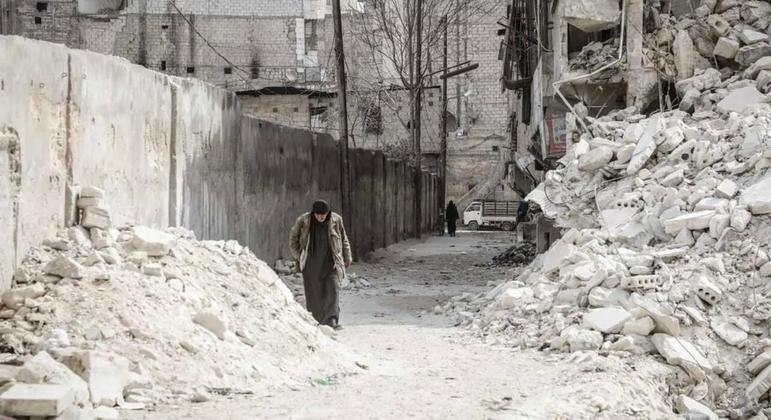Syria escalation: Deadly attacks continue, health care and access reduced
Renewed fighting in the past week led by the terrorist group Hay’at Tahrir al-Sham (HTS) and other armed groups has engulfed parts of Aleppo, Idlib and Hama, disrupting the stability that had been change from 2020.
The spokesman for the United Nations Office for Human Rights (OHCHR) Jeremy Laurence told reporters in Geneva about “a number of incidents related to accidents that caused many casualties to civilians, including a high number of women and children, caused by attacks by HTS and pro-Government forces”. .
He added: “These wars cause damage and destruction of public goods, including health facilities, facilities that provide educational institutions and food markets.”
University dorms take a beating
OHCHR has launched an investigation into the deadly attacks on civilians including the deaths of four unemployed men on 29 November, “reportedly as a result of multiple HTS-based artillery” hit the student housing complex of Aleppo university, said the OHCHR spokesman. .
“According to the information gathered by our Office, all the victims were university students, and after that, many other students ran away university center,” he added.
Access to aid remains ‘fluid’
Jens Laerke, spokesman for the United Nations Office for the Coordination of Humanitarian Affairs (OCHA), stressed that the situation in the region is “fluid and constantly changing”. While OCHA has been running “very robust” communications systems inside Syria and across the border with the humanitarian aid center in Gaziantep, Türkiye, it has been forced to suspend its operations “due to insecurity,” while the battle is still going on and many paths are going on. closed.
However, “not the whole area is locked,” he said. “There are still places where we can respond, for example, in the reception centers in Idlib” for people uprooted by violence.
According to OCHA, others 16.7 million Syrians were in need of humanitarian assistance by the beginning of 2024.
Airstrike Victims
OHCHR spokesperson Mr. Laurence also highlighted the incident of December 1 where 22 civilians were killed, including three women and seven children, and at least 40 others were injured, “reportedly due to several airstrikes carried out by pro-Government forces in Idlib” that reached the local market and five residential areas in the city.
“We remind everyone of their responsibilities and obligations under international human rights law and humanitarian law: citizens and public buildings must be protected,” he stressed.
Echoing this call, the UN Commission of Inquiry on Syria warned in a statement on Tuesday that “the atrocities of the past years must not be repeated, or Syria will be driven. a new way of cruelty“.
Health care was overwhelmed
Looking at the poor health situation in the northwestern areas, the UN World Health Organization (WHO) Representative in Syria, Christina Bethke, said that the referral hospitals, from which many patients are sent to leave Aleppo by “courageous first responders” like the Syrian Arab Red Crescent, “overwhelmed” by the stressful situation.
“Thousands of accidents have been received in the last four days alone“he said, while doctors and nurses “are working day and night to save lives, even if they put themselves and their families at great risk, they choose to stay instead of fleeing”.
Speaking from Damascus, Mrs. Bethke emphasized that “insecurity and travel restrictions have forced about 65 non-governmental organizations that previously worked in Aleppo and Idlib to stop their activities” , leaving health facilities overwhelmed or dysfunctional.
“That includes one of Idlib’s largest hospitals, Bab al-Hawa, and Al Razi Hospital in Aleppo, both of which have been reduced to serving only emergency cases and” leaving many patients without know nothing.
Aleppo’s hospitals are often closed
In Aleppo city, home to more than two million people, more than 100 health centers were operating last week. “Today, less than eight hospitals continue to operate on a limited basis“Ms. Bethke said.
He added that Monday’s airstrikes in Idlib caused significant damage to health care facilities including the University Hospital, the Maternity Hospital and the local health system.
Since 27 November, the WHO has received reports of at least six health care attacks in Syria. Mrs. Bethke also stated that medical facilities are protected under international humanitarian law.
A huge legacy of conflict
Syria’s health system has been battered by nearly 14 years of armed conflict and a WHO official said public health concerns were “escalating” amid the crisis, including increased risk of water-borne diseases and respiratory diseases in crowded settlements. Aleppo and Idlib were at the center of the 2022-2023 cholera crisis in Syria and the 2023 earthquake damaged the already fragile water and sanitation networks.
Many Syrian families have been on the move, including an estimated half a million people who entered the country from Lebanon in the past two months, fleeing the deadly conflict there.
Some of them are on the move again due to the escalation of fighting in the northwest and their situation is increasing with the onset of winter. By the beginning of 2024, 7.2 million people were internally displaced in Syria, almost half of them in the northwest, where the escalation of weapons is creating difficulties in providing life-saving assistance.
#Syria #escalation #Deadly #attacks #continue #health #care #access #reduced
